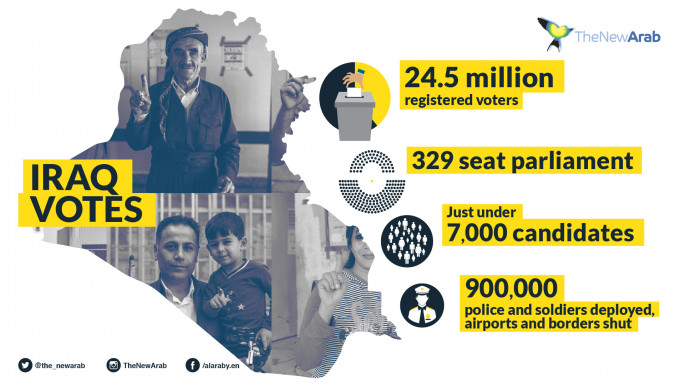Iraq on Saturday held its first parliamentary election since declaring victory against the Islamic State group in December.
Voters across the country cast their ballots under tight security, as IS and other groups pose a major security threat despite a drop in violence in recent months.
The vote comes amid tensions between Iran and the US after President Donald Trump pulled Washington out of the 2015 Iran nuclear deal, sparking worry about its impact in Iraq ahead of the vote.
Both the US and Iran are major actors in the war-torn country.
Iraq elections: Meet the contenders
Roughly 24.5 million voters face a fragmented political landscape five months after IS were ousted, with the dominant Shiites split, the Kurds in disarray and Sunnis sidelined.
Prime Minister Haider al-Abadi - who took office as IS rampaged across Iraq in 2014 - is seeking a new term, emboldened by the country's defeat of IS and for seeing off a Kurdish push for independence.
But competition from within his Shia community, the majority group dominating Iraqi politics, should divide the vote and spell lengthy horse-trading to form any government.
Overall, just under 7,000 candidates are standing and Iraq's complex system means no single bloc is likely to get anything near a majority in the 329-seat parliament.
Abadi, who has balanced the US and Iran, is facing two leading challengers to his Victory Alliance.
Ex-premier Nuri al-Maliki is widely reviled for stirring sectarianism and losing territory to IS, but draws support from hardliners.
Votes in the Sunni heartlands once dominated by IS - including Iraq's devastated second city Mosul - are up in the air as traditional alliances have been shredded. Remarkably, Islamists associated with cleric Muqtada al-Sadr have joined forces with the secular Iraqi Communist Party to field a joint list.
Some 900,000 police and soldiers are on high alert to protect the vote, with airports and borders shut for the day.
On Monday, IS claimed responsibility for the assassination of an Iraqi parliamentary candidate on Sunday night.
Polling stations are open until 6:00 pm (15:00 GMT) and initial results are expected in three days.
Follow us on Twitter: @The_NewArab
